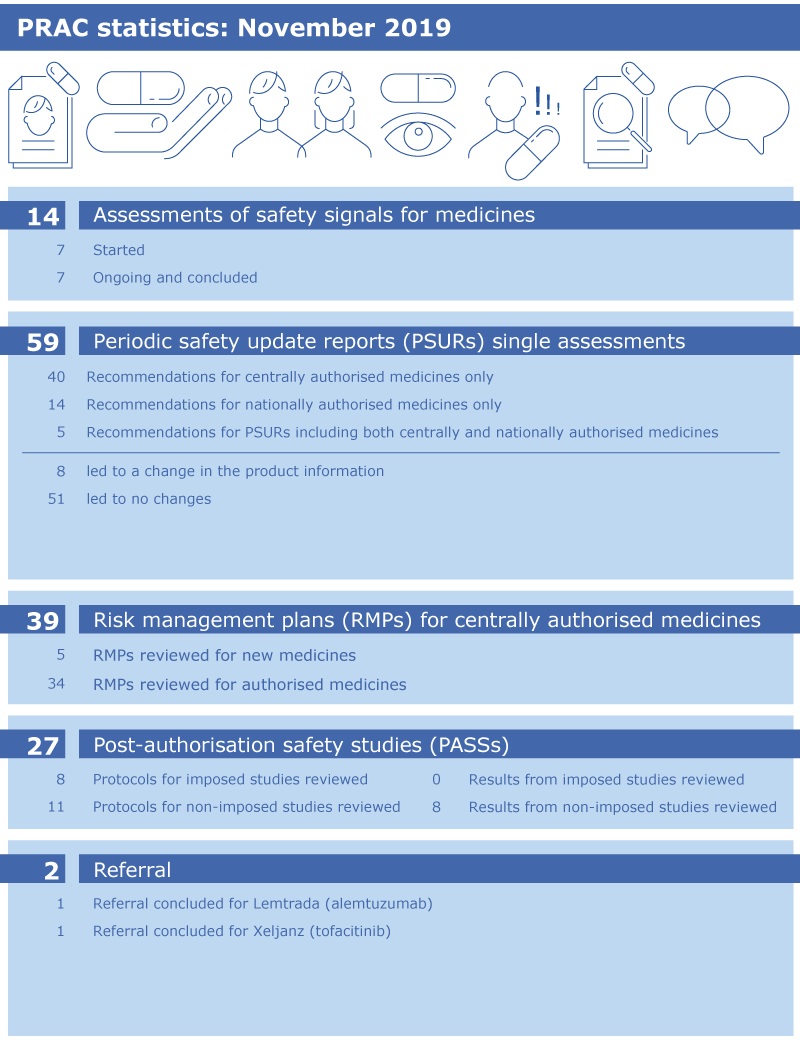Meeting highlights from the Pharmacovigilance Risk Assessment Committee (PRAC) 28-31 October 2019
NewsHumanPharmacovigilanceQuality of medicinesReferrals
PRAC recommends measures to minimise risk of serious side effects with Lemtrada for multiple sclerosis
EMA’s safety committee (PRAC) recommended restricting Lemtrada for use in adults with relapsing remitting multiple sclerosis that is highly active despite adequate treatment with at least one disease-modifying therapy or if the disease is worsening rapidly with at least two disabling relapses in a year and brain-imaging showing new damage.
The PRAC had issued interim measures on Lemtrada while reviewing reports of serious reactions. The PRAC completed the review and recommended that Lemtrada must no longer be used in in patients with certain heart, circulation or bleeding disorders or in patients who have auto-immune disorders other than multiple sclerosis.
The recommendations reflect PRAC’s review of reports concerning rare but serious effects, including deaths, from immune-mediated conditions (caused by the body’s defence system not working properly) and serious disorders of the heart, circulation and bleeding.
More information is available below.
PRAC recommends cautious use of Xeljanz for all patients at high risk of blood clots
The PRAC concluded that Xeljanz (tofacitinib) could increase the risk of blood clots in the lungs and in deep veins in patients who are already at high risk.
The PRAC recommended that Xeljanz should be used with caution in patients at high risk of blood clots. In addition, the maintenance doses of 10 mg twice daily should not be used in patients with ulcerative colitis who are at high risk unless there is no suitable alternative treatment. Patients older than 65 years of age should be treated with Xeljanz only when there is no other appropriate treatment.
These recommendations follow the PRAC’s review of an ongoing study in patients with rheumatoid arthritis and an increased risk of cardiovascular disease. The study showed an increased risk of blood clots in deep veins and in the lungs with both the 5 mg and 10 mg twice daily doses of Xeljanz as compared with patients taking TNF-inhibitors (medicines that help reduce inflammation).
More information is available below.

Glossary:
|
Procedure |
Status |
Update |
|---|---|---|
| Article-31 procedure: Cyproterone-containing medicinal products | Under evaluation | PRAC adopted a list of outstanding issues (LoOI). |
|
Article-31 procedure: Estradiol-containing (0.01% w/w) medicinal products for topical use |
PRAC recommendation issued on 3 October 2019 |
Following the PRAC’s recommendation of 3 October 2019, one of the marketing authorisation holders involved with this review has requested a re-examination. Upon receipt of the grounds for the request, the PRAC will start a re-examination, which is expected to conclude at the PRAC meeting of 13-16 January 2020. |
|
Article-20 procedure: Fluorouracil and fluorouracil related substances (capecitabine, tegafur and flucytosine) containing medicinal products |
Under evaluation |
PRAC continued its assessment. |
|
Article-31 procedure: Leuprorelin-containing depot medicinal products |
Under evaluation |
PRAC adopted a list of outstanding issues (LoOI). |
| Article-20 procedure: Picato | Under evaluation | PRAC continued its assessment |